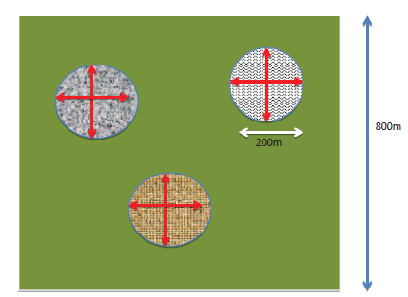|
|
Vegetation characteristics
Sampling strategy
For each site which is assumed to be approximately 1/2 mile by 1/2 mile (1/4 section), or roughly 800 m by 800 m, three random circular sub-plots of 200 m diameter will be selected. Within each circular area, the 4 transects in cardinal directions (N, S, E, W) will be measured.

Design of the sampling geometry for SMAPVEX12 forested regions. Total length of each two-sided red arrow is 200 m.
Measurements
For each transect, the following measurements will be taken:
- Height, DBH, and species of each tree within +/-1 m (or full arm span) of the transect line;
- At every 10 m interval: DBH, Diameter, # of primary branches, height from ground to base of live crown, and an estimate of the primary branch angle for the two trees closest to the transect line;
- At every 10 m interval: fractional ground cover and understory height within a 2 m by 2 m area (or larger).
Information on vegetation parameters, their measurement method and equipment needed to make the measurements is given in the table below. More details can be found in the experimental plan of SMAPVEX12.
Measurement types over the forest site and equipment needed for vegetation sampling
| Measurement |
Units |
Measurement method, equipment required |
Equipment needed (required minus owned) |
Expected measurement error |
| Needle/leaf |
|
Telescoping scissors, pruning shears |
NEED |
|
| Length |
m |
Measuring tape |
Have 1 |
10% |
| Dry mass |
kg |
Oven dried, balance weighed |
AAFC |
7% |
| Shape |
descrip. |
Visual identification |
(Wikipedia) |
5% |
| Wet mass |
kg |
Field balance |
AAFC |
8% |
| Needle/leaves density |
# m-3 |
Count/visual estimate |
– |
– |
| Branch |
|
Ladder, tree climber, scaffold, saw |
NEED |
|
| Branch diameter |
m |
Measuring tape (steel) |
Have 1 |
15% |
| Branch length |
m |
Measuring tape (steel) |
Have 1 |
8% |
| Dry mass |
kg |
Oven dried, balance weighed |
AAFC |
7% |
| Mean angle (orientation) |
° |
Compass; inclinometer/altimeter |
Have 1 |
15% |
| Primary branch density |
# m-3 |
Count |
– |
10% |
| Secondary branch density |
# m-3 |
Count/visual estimate |
– |
20% |
| Wet mass |
kg |
Clippers, field balance |
NEED |
8% |
| Tree |
|
|
|
|
| Ground to canopy height (trunk height) |
m |
Laser altimeter, hypsometer* |
Have 1 |
7% |
| Tree height |
m |
Laser altimeter, hypsometer* |
Have 1 |
10% |
| Upper stem diameter (?) |
m |
Ruler |
Have 1 |
10% |
| Diameter at breast height (1.3 m, DBH) |
m |
DBH tape; tree caliper; Biltmore stick (?) |
Have 1 |
4% |
| Dielectric constant (trunk, branches, leaves/needles) |
kg m-2 |
Dielectric constant probe |
Have 1 (under development) |
? |
| Species identification |
Name |
Visual identification (field guide) |
"Trees of the Northern United States and Canada" by John Laird Farrar |
2% |
| Stem dry wood density |
kg m-3 |
Stem corer (Bark gauge?); increment borer; oven dried, balance weighed |
Have |
5% |
| Understory (shrubs, herbs, mosses, lichens) |
|
|
|
|
| Dry mass (non-partitioned) |
kg |
Clippers; pruning shears; oven dried, balance weighed |
NEED clippers |
15% |
| Wet mass (non-partitioned) |
kg |
Clippers, field balance |
NEED clippers, field balance (AAFC) |
7% |
| Fractional understory vegetation cover |
m2 m-2 (percentage?) |
Quadrat; count/visual estimate |
NEED |
10% |
| Species identification |
Name |
Visual identification |
– |
5% |
| Litter depth |
m |
Spade, measuring tape (steel); measuring pole |
Have |
– |
| Forest |
|
|
|
|
| Fractional vegetation cover |
m2 m-2 (percentage?) |
Quadrat, balance, scope, visual ID, densitometer* |
NEED |
8% |
| Leaf area index (LAI) |
m2 m-2 |
LAI-2000 |
AAFC (2) |
12% |
| Fractional necromass cover |
m2 m-2 (percentage?) |
Quadrat, densitometer* |
NEED |
10% |
| Stem density |
# m-2 |
Count |
– |
7% |
|












